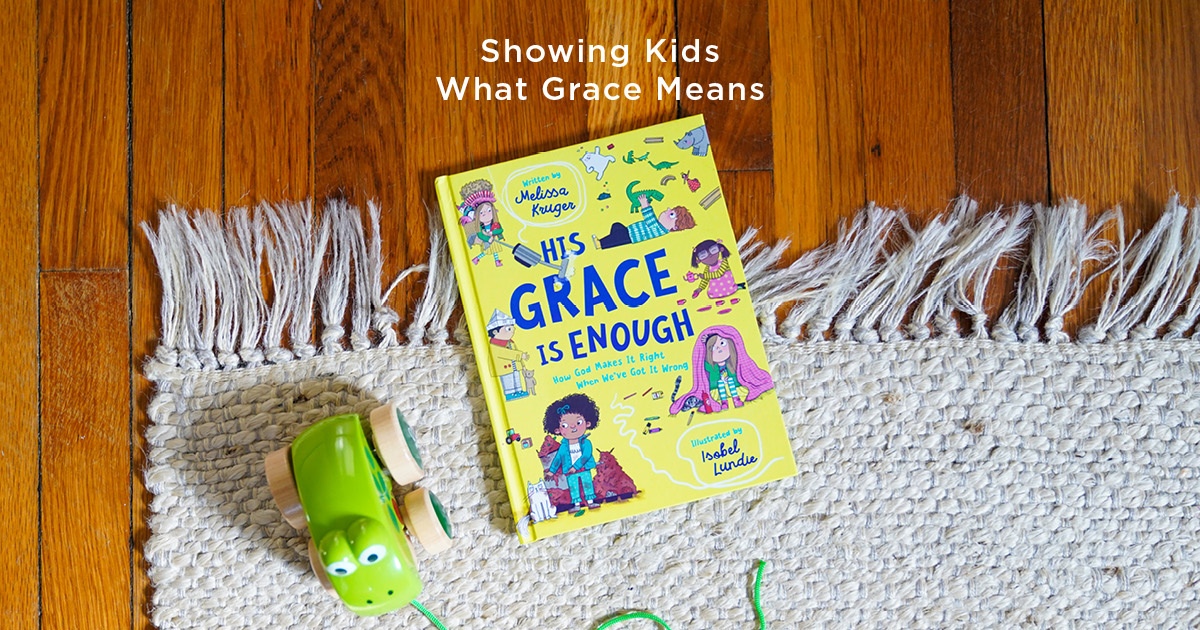
What is it about grace that’s so hard to grasp? I’ve lost count of the number of times I’ve asked children and young people from Christian homes why Jesus died, or what difference forgiveness makes to our lives, and they’ve come back with thoughts about how you ought to behave—no grace in sight. Or I’ve asked them what grace means and they’ve triumphantly told me it’s God’s Riches At Christ’s Expense, but without being able to explain what that means in practice. “What riches?” I say. “Ummm…” they reply.
Maybe one thing that makes grace hard to articulate is that it’s an experience. It won’t work just on the page, an abstract concept. It has to be lived.
We need to figure out how to help children really experience grace in their lives.
What is grace, as an experience? Maybe it’s best described as the coming together of two experiences—the experience of guilt, and the experience of love. Each of these viewpoints seems incompatible with the other. It’s only grace that brings them together.
On one side, there’s the terrible feeling of being bad, guilty, irredeemable, worthless. “I’m bad,” a young mum told me she’d heard her toddler say despondently not long ago. He could see no possibility of anything else.
Maybe it’s best described as the coming together of two experiences—the experience of guilt, and the experience of love.
On the other side, there’s the enjoyment of freedom, the comfortable feeling of being loved, the good works Christ calls us to. And when we’re doing well, when we’re being praised for our godliness or good behaviour, when we can see our spiritual growth, doesn’t it seem that of course Jesus loves us? Our utter undeservingness is easily forgotten.
It’s like heat or cold. When winter bites, you can’t imagine how you could ever have worn shorts last summer. Or when you’re packing for a trip to a colder country, you can’t imagine you could ever need this much knitwear. In either state, it can be impossible to imagine the other.
Grace is a kind of teeter point. It’s the rotating door between a centrally-heated interior and the freezing fresh air outside (or an air-conditioned interior and the sweltering heat outside). When grace is put into action, we see our guilt and God’s love—both at once. I am a sinner, and justified. I am justified, and a sinner. Suddenly it’s breathtaking. Amazing grace.
However clearly we explain grace to our children, if they haven’t experienced it for themselves I fear it’ll be like reading about a hot country they’ve never been to, or seeing the Arctic on the TV without ever having heard the crunch of their own footsteps in snow. They might understand it, but they haven’t lived it.
But when children do experience that teeter point for themselves, they will really grasp what Jesus’ death means for them—what riches are offered, what an immense expense was paid, and how scandalously, extraordinarily amazing that is.
Whenever they mess up—and they will—we can take the opportunity to point them to the one whose grace gives the greatest riches of all.
Thankfully there are plenty of ways to demonstrate grace with children. Whenever they mess up—and they will—we can take the opportunity to point them to the one whose grace gives the greatest riches of all. We can turn their everyday experiences of guilt and love into something that will help them know God’s amazing grace for themselves.
Melissa Kruger’s book His Grace is Enough aims to help parents do exactly this. It starts with a child hiding or running away, having done something wrong and not knowing how to make it all right again. The experience of guilt.
But as the book goes on, we learn that although we can’t make it all right again, God can. “God’s grace is enough”—and readers are drawn into an experience of God’s love and all that it means. The wonder of forgiveness, and the freedom of living for him.
It’s an invitation into the teeter point. A glimpse of God’s riches—not just on the page, but in our children’s lives.
“But because of his great love for us, God, who is rich in mercy, made us alive with Christ even when we were dead in transgressions—it is by grace you have been saved.” (Ephesians 2:4-5)